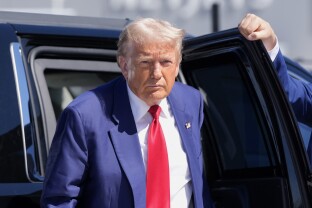Donald Trump’s lawyers didn’t just try to delay his scheduled criminal sentencing. They also hinted at how the president-elect is fully embracing a definition of presidential immunity that puts him squarely above the law — one that legal scholars argue is a misreading of the Supreme Court’s opinion.
Following a New York judge’s surprise decision on Friday to proceed this week with sentencing Trump for 34 felonies of faking business documents in the Stormy Daniels hush money case, Trump’s lawyers Sunday called to delay the sentencing hearing and objected to Justice Juan Merchan’s rulings rejecting their previous attempts to toss Trump’s conviction. (Merchan denied Trump’s attempt to put off the sentencing date.)
But a close reading of the filing shows that Trump was trying to delay his upcoming sentencing by claiming that presidents and presidents-elect have immunity that cannot be checked by the nation’s courts, going beyond the Supreme Court’s already broad opinion on the matter, legal experts told NOTUS.
“As the U.S. Supreme Court emphasized, the doctrine of Presidential immunity nullifies the power of trial courts to act,” Trump’s lawyers wrote.
“The court should not continue to act while its very power to act in the first place is under appellate consideration,” they continued. “This conclusion, moreover, is even more forceful when it comes to President Trump’s claim of sitting-president immunity, which all parties agree becomes comprehensive and absolute as soon as President Trump takes office.”
Those arguments “are dead wrong,” University of North Carolina law professor Michael J. Gerhardt said.
“They misstate what the [Supreme Court] ruled in Trump v. United States. The immunity the court recognized applied to the protection of official acts by the president — but this lawsuit had nothing to do with a president’s official duties. Trump lawyers proceed as if the court granted absolute immunity to current or former presidents from criminal prosecutions. That is not what the court said. Indeed it dismissed such claims,” Gerhardt said of the filing.
“Presidential immunity is linked to official conduct, and the conduct that is the subject of the lawsuit is not in any way, shape or form official. The court also emphasized its ruling did not place the president above the law, but Trump’s reasoning unsurprisingly seeks to do just that,” he added.
Late Monday afternoon, Merchan once again scrapped the Trump team’s arguments, calling them out for misinterpreting the law and misquoting it. He said the legal “authorities” they relied on were “factually distinguishable from the actual record or legally inapplicable.”
Notably, the legal filing was authored by two lawyers who Trump has already nominated to key top positions at the Justice Department and are awaiting Senate confirmation: Todd Blanche and Emil Bove.
Blanche has been tapped as the department’s second-in-command as deputy attorney general, an influential position that would have him potentially oversee any retaliatory action against those whom Trump considers his political enemies. Meanwhile, Bove has been nominated to be principal associate deputy attorney general, the third-highest ranking official at the DOJ.
“All parties agree that, once President Trump assumes office, he will be absolutely immune from any criminal process, state or federal, under the doctrine of sitting-President immunity,” Blanche and Bove wrote, confidently asserting that their appeal “which will result in the mandated dismissal of this case.”
Columbia University law professor Daniel Richman warned that “this foreshadows the blanket claims of immunity Trump will likely raise in the future, including after his four-year term.”
“Not only does the filing cherry-pick and stretch pieces of the Supreme Court’s ruling to create blanket immunity for presidents and even presidents-elect, but it would effectively freeze proceedings that rejected any of his arguments, even weak ones, until the Supreme Court has spoken,” he said.
Stephen A. Saltzburg, a law professor at George Washington University, said Merchan’s recent decision was “thoughtful” and “careful” to avoid threatening Trump with a prison sentence — something that could get the Supreme Court’s attention and possibly raise legitimate concerns that Trump wouldn’t be able to exercise presidential authority on the first day of his next term. However, he cautioned that Trump’s lawyers still went too far here.
“They stretch it,” he said, adding that Trump’s current interpretation of immunity reveals what’s to come.
“He is likely to try and take advantage of that immunity. The guardrails essentially are off for him — and any other president. But other presidents would self-impose restraints. He’ll take the Supreme Court opinion as carte blanche to do whatever he wants,” Saltzburg said.
—
Jose Pagliery is a reporter at NOTUS.
Sign in
Log into your free account with your email. Don’t have one?
Check your email for a one-time code.
We sent a 4-digit code to . Enter the pin to confirm your account.
New code will be available in 1:00
Let’s try this again.
We encountered an error with the passcode sent to . Please reenter your email.


